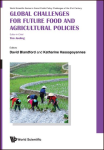Josling T. (ed.), Blandford D. (ed.), Hassapoyannes K. (ed.). (2019). Global challenges for future food and agricultural policies. Singapore : World Scientific Publishing. 440 p. (World Scientific Series in Grand Public Policy Challenges of the 21st Century).
https://doi.org/10.1142/10860
https://doi.org/10.1142/10860
| Titre : | Global challenges for future food and agricultural policies |
| Auteurs : | T. Josling, ed. ; D. Blandford, ed. ; K. Hassapoyannes, ed. |
| Type de document : | E-Book |
| Editeur : | Singapore : World Scientific Publishing, 2019 |
| Collection : | World Scientific Series in Grand Public Policy Challenges of the 21st Century |
| ISBN/ISSN/EAN : | 978-981-323-541-0 |
| Format : | 440 p. |
| Langues : | Anglais |
| Langues du résumé : | Anglais |
| Catégories : |
Catégories principales 08 - ALIMENTATION ; 8.3 - Politique et Sécurité AlimentaireThésaurus IAMM POLITIQUE ALIMENTAIRE ; POLITIQUE AGRICOLE ; SYSTEME AGROALIMENTAIRE ; SECURITE ALIMENTAIRE ; CHANGEMENT CLIMATIQUE ; GESTION DES RESSOURCES NATURELLES ; AGRICULTURE ; DEVELOPPEMENT AGRICOLE ; NOUVELLE TECHNOLOGIE ; TERRE AGRICOLE ; GESTION DES EAUX ; ADAPTATION AU CHANGEMENT ; ORGANISATION INTERNATIONALE ; COMMUNICATION |
| Résumé : |
This book examines the current and future challenges facing the food and agricultural system and their implications for policymaking at the national and international level.
The growth in global population and income is expected to result in increasing demand for food and agricultural raw materials, intensifying concerns over food security and increasing pressure on the planet's natural resources. Moreover, climate change — a challenge on its own — is likely to increase the urgency for reforms in the food and agricultural sector. As a substantial contributor to greenhouse gas emissions, the sector will need to participate in efforts to slow global warming and to adjust to the effects of climate change, while ensuring global food security and resource sustainability. These pressures define a new set of priorities for policymaking at the national and international level. They also necessitate changes in the framework of global institutions for effective governance of the food system. Global Challenges for Future Food and Agricultural Policies presents a comprehensive analysis of the inter-related policy challenges of food security, management of natural resources, climate change, and international governance. The book also offers valuable insights into options for effective policymaking with the goal of inducing positive policy changes to the food and agricultural sector. |
| Note de contenu : |
• Chapter 1: Introduction
• Chapter 2: Policies for Global Food Security • Chapter 3: The International Role in Agricultural Development • Chapter 4: Research and Development • Chapter 5: Intellectual Property and the Supply of New Technology to Agriculture • Chapter 6: Industry Structure in Input Supply Industries for Agriculture • Chapter 7: Meeting Future Food Needs in Sub-Saharan Africa • Chapter 8: Policy Challenges in the Management of Natural Resources • Chapter 9: Policy Options for Efficient Agricultural Land Management • Chapter 10: The Agriculture–Water Policy Nexus • Chapter 11: International Agreements on Global Resource Management • Chapter 12: Agriculture and Climate Change: National and International Policy Response • Chapter 13: Mitigation Challenges and Options in Agriculture • Chapter 14: Adapting to Climate Change in Agriculture: Challenges and Options • Chapter 15: Agricultural Risk Management and Climate Change: What Role for Policy? • Chapter 16: The Role of International Organizations in Agricultural Policy Analysis • Chapter 17: Rational Economic Policy-making • Chapter 18: Information, Communication, and Agricultural and Food Policies in an Age of Commercial Mass and Social Media • Chapter 19: Governance of the “Big Five” International Organizations Concerned with Food Security and Nutrition • Chapter 20: The Agricultural Policy Framework in the 21st Century — Endnote |
| Cote : | Réservé lecteur CIHEAM |
| URL / DOI : | https://doi.org/10.1142/10860 |







